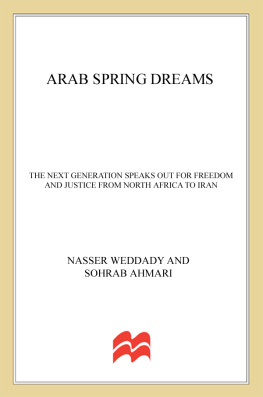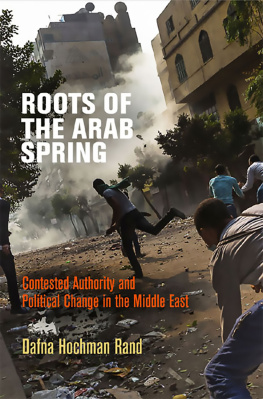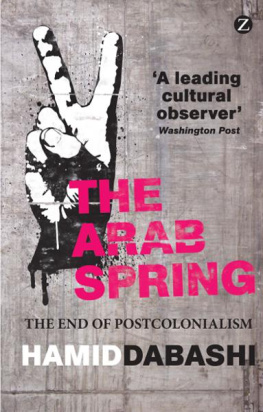PRAISE FOR ARAB SPRING DREAMS
You are now holding an exceptional book. It is particularly now when the eyes of the whole world are anxiously set on the Middle East that I am so eagerly looking forward to getting to know the stories which often do not make themselves heard among the brouhaha in the media. The essays collected here are a particularly important testimony and close to my heart as they are written by young courageous people who dare to dream of the things their parents never dreamt of. The book clearly demonstrates that no matter where we live or what religion we follow, certain fundamental values are universal.
Lech Walesa, Nobel Peace Prize recipient and the former president of Poland
Immediate and raw, the essays in this collection provide glimpses of daily life in countries where civil rights do not exist. Though the essay contest seemed like a quixotic gesture at its inception in 2005, it turns out to have been prescient.
Publishers Weekly
For too long, American readers have looked to unreliable intermediaries to learn whats on the minds of the Arab youth. But now two of the most promising young thinkers from the region have offered up a gem, Arab Spring Dreams, giving us access to their generations most authentic voices. To further their worthy fight for freedom, let us begin by lending an ear to their moving narratives.
Roya Hakakian, author of Journey from the Land of No and Assassins of the Turquoise Palace
These are extraordinary and ordinary stories that underline an immutable truth: people want to live as free beings with dignity and equal rights. This collection of powerful testimonies is gripping, heart-breaking, and inspiring, offering the only antidote to the abyss of a society lacking rule of law: educated hope. These pages reveal that the struggle for civil rights in the Middle East is still ongoingand will require allies the world over who recognize the universality of the struggle for human rights and the responsibility borne by those of us living in freedom.
Thor Halvorssen, President, Human Rights Foundation
Arab Spring Dreams offers a compelling journey through the hearts, minds, and souls of the generation that rocked the worlds most repressive region. A firsthand account of the struggle for democracy in the Middle East and a terrific roller coaster of burning frustrations and passionate aspirations. Buckle up!
Ahmed Benchemsi, Stanford University Center on Democracy, Development and the Rule of Law
This book inspires hope that todays younger generations of Arabs and Iranians will bequeath to their children a much more tolerant and democratic Middle East than the one they inherited from their parents.
Karim Sadjadpour, Carnegie Endowment for International Peace
Sohrab Ahmari and Nasser Weddady have assembled a chorus of new voices from across the Arab and Iranian Middle East, and all of the voices are young, and all of them are plaintive. Not everyone among the contributors to this anthology sees things the same way, but everyone is filled with yearning for a better future, and the yearning is touching. Will the better future come about? One thing is certain: a better future for the Middle East and for the larger world will come about only if people from different corners of the world do a better job of speaking to one another. Arab Spring Dreams contributes to that noble cause. And Ahmari and Weddady are writers to watch.
Paul Berman, author of Terror and Liberalism and The Flight of the Intellectuals
A R A B
S P R I N G
D R E A M S
A R A B
S P R I N G
D R E A M S
THE NEXT GENERATION SPEAKS OUT FOR FREEDOM AND JUSTICE FROM NORTH AFRICA TO IRAN
EDITED BY NASSER WEDDADY AND SOHRAB AHMARI
FOREWORD BY GLORIA STEINEM
FEATURING WRITINGS FROM THE AMERICAN ISLAMIC CONGRESSS DREAM DEFERRED ESSAY CONTEST

The author and publisher have provided this e-book to you for your personal use only. You may not make this e-book publicly available in any way. Copyright infringement is against the law. If you believe the copy of this e-book you are reading infringes on the authors copyright, please notify the publisher at: us.macmillanusa.com/piracy.
CONTENTS
To the thousands of young Middle Easterners who have shared their dreams with usand to Jesse Sage, mentor, friend, dreamer.
To my late brother Wael, whose birth I missed, and whose funeral I could not attend.
Nasser Weddady
To my mother.
Sohrab Ahmari
FOREWORD
THE POWER OF STORIES
Gloria Steinem
FOR MOST OF HUMAN HISTORY, WE HAVE BEEN GATHERING around campfires for light and warmth and telling stories.
This is the way our history came down to us and also came to include us. This is the way a woman or a man or a child told us what happened to them that day. This is the way one person told of a danger or heard others who experienced it, too, and all could discover that it was not a personal weakness, or that in the telling, there was a shared solution.
Symptoms of illness were recognized in stories, humor was turned into group laughter, and a person with a gift for predicting the weather could share it. So could someone who found a school of fish or a faraway trove of berries or the handprints and drawings left in caves or on rock faces by other groups as symbols of their stories.
Telling stories meant sitting in a circle while one person at a time spoke and others listened. Often there was a symbolic object that was passed to each in turn. Only he or she could speak while holding it. Since each had to be listened to, there was a natural rhythm of stories that were short or long, a democracy of speaking and listening.
A parent or an elder might tell a childs story before she or he had language to speak, and observe the unique person within that child. Indeed, uniqueness was often the source of a childs naming. Later, speech continued that unique story in the childs own words, and she or he joined the circle, too.
If there was a decision that involved more than one such groupsay, the fate of a water hole or the use of a migratory patheach group selected a Wise Person to sit in a circle with those from other groups. This was the beginning of governance with the collective welfare in mind.
Some form of this sequence of circles was known to the original cultures of southern and eastern Africa where all humans originated, and spread with them along migratory paths to southern India and Australia and the Americas. The United States has only recently begun to acknowledge that the original cultures conquered by Europeans were more the source of democracy than was Greece, with its slavery and exclusion of women. The Iroquois Confederacy, a coalition of seven large and far-flung language groups, had a well-developed form of governance that balanced local with overall powers. It was imitated by the US Constitutionso much so that two Iroquois elders attended its drafting as advisors.
One question from those Iroquois was, Where are the women? My country took two more centuries before, as among the Iroquois, women as well as men were included in decision making and there was no slavery. We have yet to adopt the Iroquois standard of measuring each decision against the welfare of seven generations forward. But much that readers who come to this book out of interest in democracy might find positiveif still very imperfect in the United Stateswas developed during the first 95 percent of human history.
Now we know that only in recent millennia in some parts of the world and only in recent centuries in othershas the paradigm of the circle changed to the pyramid or hierarchy, with those on top telling their stories while those in the middle and at the bottom only listen. I say this not to suggest answers, but to open questions:
Next page







